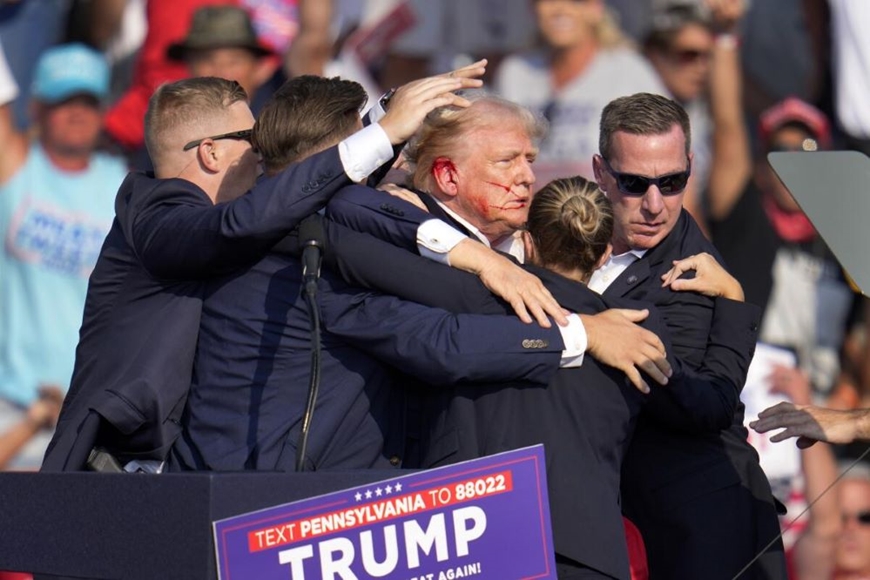The shooting at former US President Donald Trump’s campaign has increased the likelihood of his return to the White House, and investors expect a flurry of bets on a Trump victory this week.

| Donald Trump was evacuated by secret service agents after a shooting at a campaign rally in Pennsylvania, US. Photo: AFP |
Mr. Trump was shot in the ear during a campaign rally in Pennsylvania on July 13 and authorities determined it was an assassination.
Mr Trump, whose face was covered in blood, raised his fist shortly after the attack and his campaign said the former president was fine after the shooting.
Before the shooting, markets had reacted to the prospect of a Trump presidency by pushing the dollar higher and preparing for a steepening of the U.S. Treasury yield curve. Those trades could intensify this week, said Rong Ren Goh, portfolio manager at Eastspring Investments in Singapore.
The July 13 incident was the first shooting of a US president or major party candidate since the assassination of Republican President Ronald Reagan in 1981. The incident could upend the November 5 rematch between Republican Trump and incumbent President Joe Biden, a Democrat.
Nick Ferres, chief investment officer at Vantage Point Asset Management, cited polls showing that support for Ronald Reagan surged after his 1981 assassination.
World leaders and US politicians have condemned the shooting, while several chief executives, including Tesla electric carmaker billionaire Elon Musk, have announced their support for Mr Trump in his bid to return to the White House.
A day after the shooting at a Trump campaign rally in Pennsylvania, authorities are investigating the past of a man identified as Thomas Matthew Crooks, who has been identified as a suspect in the “assassination plot.”
Since his shaky debate performance with Mr. Trump two weeks ago, President Biden has faced growing skepticism from donors, supporters and Democrats about his ability to beat Mr. Trump and meet the demands of the job.
Immigration and the health of the economy are key issues for US voters and according to Reuters/Ipsos polls, they see Mr Trump as the better candidate for the US economy, even as the White House seeks to promote a solid economy with slowing inflation and low unemployment.
Under Mr Trump, market analysts expect the US to adopt a more hawkish trade policy, less regulation and looser climate change rules. Investors also expect the extension of corporate and personal tax cuts to expire next year, raising concerns about rising budget deficits.
Mr. Trump affirmed in an interview in February that he would not reappoint Federal Reserve Chairman Jerome Powell, whose second term as chairman expires in 2026.
Michael Purves, CEO of Tallbacken Capital Advisors, believes that a Trump victory in the 2024 presidential election could put pressure on US Treasury yields, especially if Trump delivers on his pledge to cut taxes, raise tariffs and deport illegal immigrants – actions that some investors believe could cause inflation to rise again.
Another possibility for inflation is that the Fed is expected to ease monetary policy next year, Mr. Purves said.
“If (Trump) wins and does what he says, it will lead to a much bigger sell-off on the back of the bond market,” Purves predicted. “I think the bond market is a bigger (election) trading market this year than the stock market.”
Long-term US Treasury yields have risen along with the possibility of Mr Trump returning to the White House for a second term.
While the moves in the U.S. Treasury yield curve have been largely driven by shifting expectations for the Fed’s first rate cut of the cycle, the yield gap between the 2-year and 30-year bonds has narrowed to minus 6 basis points, from minus 30 basis points around the time of the Biden-Trump debate.
In addition, the gap between 2- and 10-year Treasury yields is also at minus 27 basis points, half of what it was three weeks ago.
“Trump has always been more of a ‘market guy’. The key question going forward is whether fiscal policy remains irresponsibly loose and the impact that could have on inflation (recurring) and the future trend in interest rates,” Ferres said.
Green is dominating the US stock market . Both the S&P 500 and the Dow Jones Industrial Average hit record highs on the final trading day of last week, July 12, before the assassination attempt on Mr. Trump. The S&P 500 is up 18% year to date.
Analysts at Goldman Sachs cited that: “In about five presidential elections over the past 20 years, CEO confidence, consumer sentiment , and especially small business optimism have shifted more favorably following Republican victories than Democratic victories.”
“In the event that improved sentiment leads to increased spending and investment, a Trump victory could boost some companies’ earnings prospects even without significant policy changes,” Goldman Sachs said.
Immediately after the shooting, billionaire hedge fund manager Bill Ackman voiced his support for Mr. Trump, while billionaire Elon Musk also supported Mr. Trump and called him “tough” on social network X.
Meanwhile, some investors believe the impact of the shooting will be relatively small, especially on the stock market. Stock traders are particularly bad at pricing in events that have an ambiguous impact on revenue, profits, cash flow, etc., and this weekend’s incident falls into that category, according to Steve Sosnick, chief strategist at Interactive Brokers, a multinational brokerage firm in the US.





